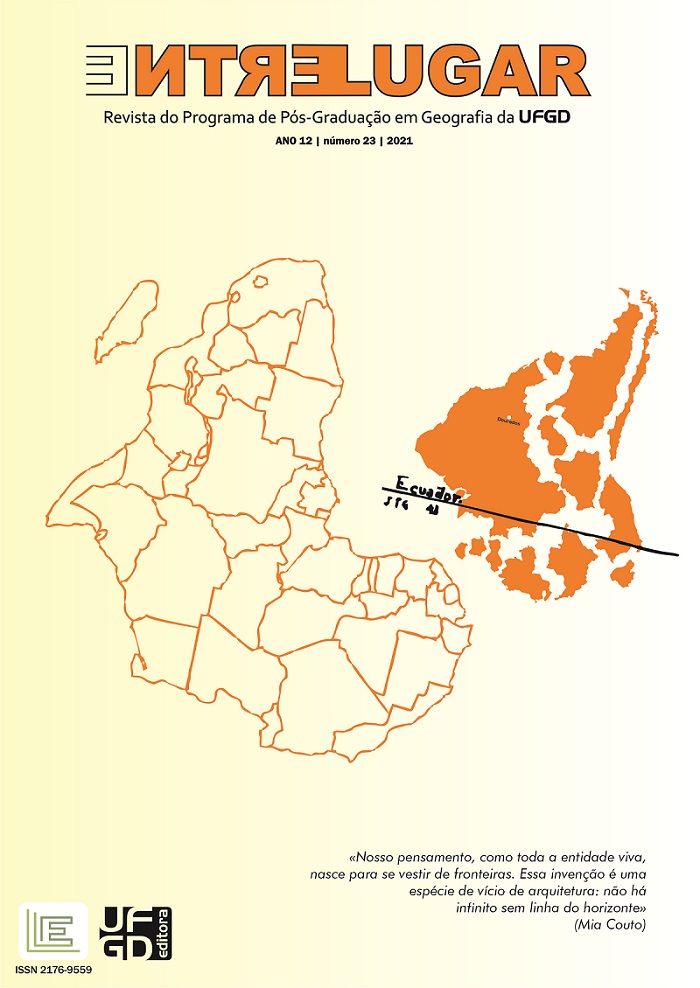The power of tourist capital in camping territories in the province of Inhambane-Mozambique
DOI:
https://doi.org/10.30612/el.v12i23.14795Keywords:
Foreign capital. Rural space. Power. Country territory.Abstract
How to understand the impacts of neoliberal policies, in particular, those that embody the implementation of private initiatives, and which translate into impositions of capital in the territories of the peasants - Local Communities, in the province of Inhambane? Based on this issue, we propose to launch a debate on the processes of territorialization of tourist capital, in the context of the implementation of local development policies in the municipality of Inhambane, province of Inhambane, in Mozambique. Our aim in this article is to interpret the transformations taking place in the field (agrarian space). The debate starts from the assumption that tourism is a social phenomenon, which some think is possible, through it, to generate economic gains. This idea validates that in the process of promoting tourism, it spreads and creates imaginary of what are considered benefits from tourism: tax revenues for governments; job posts; partnerships between tour operators with local producers, culture makers, etc. What stimulates the imaginary of these economic benefits, and the idea that tourism is the economic segment that moves more money, the socioeconomic sector that creates more jobs, when compared to other branches of economic activities. The material treated here was obtained through bibliographic research, document review and field observations.
Downloads
References
CISTAC, Gilles e CHIZIANE, Eduardo. Turismo e Desenvolvimento Local. Universidade Eduardo Mondlane – Faculdade de Direito. Maputo, 2007.
CONSELHO MUNICIPAL DE INHAMBANE. Plano Municipal de Gestão Ambiental do Município de Inhambane, 2009.
DIRECÇÃO PROVINCIAL DO TURISMO. Plano Estratégico de Desenvolvimento do Turismo da Província de Inhambane (2014 – 2020). Inhambane, 2014.
HANLON, Joseph. Paz sem beneficios: como o FMI bloqueia a reconstrução de Moçambique. Tradução de Maria de Lurdes Torcato. Centro de Estudos Africanos. Imprensa Universitária – UEM, 1997.
INSTITUTO NACIONAL DE ESTATÍSTICA. Estatísticas do Distrito Cidade de Inhambane. Maputo, 2013.
INSTITUTO NACIONAL DE ESTATÍSTICA. IV Recenseamento Geral da População e Habitação 2017: Resultados Definitivos. Moçambique: Maputo, 2019.
JAMAL, Saíde. Um olhar sobre o processo de descentralização em Moçambique - mecanismos de accountability pública: Orçamento Participativo e os Conselhos Consultivos Locais. In: XII CONLAB 1º Congresso da Associação Internacional de Ciências Sociais e Humanas em Língua Portuguesa. Faculdade de Ciências Sociais e Humanas da Universidade Nova de Lisboa, 2015.
KNAFOU, Remy. Turismo e Território: Por uma abordagem científica do turismo. In: ADYR A. B. Rodrigues (Org.). Turismo e Geografia: reflexões teóricas e enfoques regionais. 2.ed. Hucitec, São Paulo, 1999.
PIKETTY, Thomas. O Capital no século XXI. Tradução Monica Baumgarten de Bolle. 1ª ed,. Intrínseca: Rio de Janeiro, 2014.
PLOEG, Jan Douwe van der. Camponeses e imperios alimentares: lutas por autonomia e sustentabilidade na era da globalização. Tradução de Rita Pereira. Editora da UFRGS: Porto Alegre, 2008.
ROVICENE, Samuel João; MASSUANGANHANE, Israel Jacob. A terra. DINAGECA: Maputo, 2001.
SANTOS, Milton. Da Totalidade ao Lugar. Editora da Universidade de São Paulo, 2005
SOCIEDADE DE ESTUDOS DE MOÇAMBIQUE. Exploração dos Recursos Naturais. Instituto de Investigação Agronómica, 1963.
SOCIEDADE DE ESTUDOS DE MOÇAMBIQUE. Protecção e Exploração dos Recursos Naturais de Moçambique. Instituto de Investigação Científica de Moçambique, 1963.
Downloads
Published
How to Cite
Issue
Section
License
Autores que publicam nesta revista concordam com os seguintes termos:
- Autores mantém os direitos autorais e concedem à revista o direito de primeira publicação, com o trabalho simultaneamente licenciado sob a Creative Commons Atribuição-NãoComercial-CompartilhaIgual 3.0 Brasil que permitindo o compartilhamento do trabalho com reconhecimento da autoria do trabalho e publicação inicial nesta revista.
- Autores têm autorização para assumir contratos adicionais separadamente, para distribuição não-exclusiva da versão do trabalho publicada nesta revista (ex.: publicar em repositório institucional ou como capítulo de livro), com reconhecimento de autoria e publicação inicial nesta revista.
- Autores têm permissão e são estimulados a publicar e distribuir seu trabalho online (ex.: em repositórios institucionais ou na sua página pessoal) a qualquer ponto antes ou durante o processo editorial, já que isso pode gerar alterações produtivas, bem como aumentar o impacto e a citação do trabalho publicado (Veja O Efeito do Acesso Livre).




